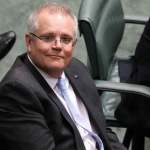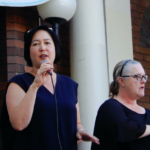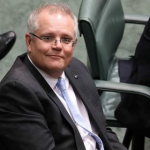No Support for Religious Privileging Laws: An Interview With the Rationalist Society’s Neil Francis

Newly minted attorney general Michaelia Cash has signalled she’s producing a new draft of the Religious Discrimination Bill (RD Bill), which is a piece of legislation that purports to protect those of faith, whilst actually providing them with the privilege to discriminate against all Others.
The religious discrimination legislation is the charge of the nation’s chief lawmaker, however it’s actually the pet project of Scott Morrison going back to the time before he took on the role of prime minister, when he appeared in the press in December 2017, as treasurer, outlining this aim.
Morrison announced that he’d be prioritising the legislating of further religious “protections” just two weeks after federal parliament legalised marriage equality. Hence, the religious freedoms debate is a reaction from the religious right – aka the Christian Right – to same-sex marriage laws.
In the lead up to the first draft of the RD Bill, there were justifiable concerns about its implications for LGBTIQ communities. However, on release, it was found that the Coalition is pushing for laws that permit open slather discrimination against all minorities if a religious person’s faith justifies it.
A progressive secular outlook
Firmly opposed to the RD Bill in its current form, the Rationalist Society of Australia has just released its first in a series of reports titled, Religiosity in Australia. It aims to “dispel misconceptions about religion promoted by vested interests” by revealing the actual religious attitudes and behaviours of Australians.
The report sets out that while 60 percent of Australians indicated an affiliation with a religion in the 2016 census, Rationalist Society research uncovered that 62 percent of the nation doesn’t belong to a religious organisation and 71 percent of Australians say religion is not important to them.
The Society outlines that rather than seeking religious protections, most Australians, including those of faith, now support progressive social reforms not usually associated with the majority Christian religion, such as abortion, voluntary assisted dying, marriage equality and legalising cannabis.
According to the report, legislators and governments would be wise to consider the true sentiments of the Australian constituency, which includes “a much smaller and softer base of religiosity” than often claimed in the media, along with a “rapidly growing rate” of citizens with no religion.
Dispelling the myths
Most Australians consider our nation to be a secular one. However, the Pentecostal PM doesn’t. In his 2008 maiden speech in parliament, he said, “Australia is not a secular country—it is a free country.” And now he’s pushing for laws that will ultimately privilege those of the Christian faith.
Rationalist Society fellow Neil Francis is the author of the report. He’s brought his background in medical research, as well as social and market research to produce a better understanding of the low level of support the Coalition’s proposal to privilege the religious actually has.
And Francis has also lobbied for voluntary assisted dying laws nationally
Sydney Criminal Lawyers spoke to Neil Francis about the idea that the Coalition’s surprise election win in 2019 was in part due to the religious turning away from Labor’s progressive policies, the issues with the first two drafts of the RD Bill, and how the laws would privilege those of faith over the non-religious.

Firstly, the Rationalist Society has just released its Religiosity in Australia report, which is a detailed analysis of the relationship Australians currently have with religion.
The data within the report has been compiled against a backdrop of the mounting religious freedoms debate, which has prime minister Scott Morrison as one of the key figures calling for greater religious freedoms/exemptions in this country.
Neil, you’re the author of the report. Broadly speaking, what did you find?
We found that Australians’ relationship with religion is far weaker than the headline Census data implies, or indeed that clerics would have us believe.
For example, amongst those who tick one or other religious denomination box, more than a third – 37 percent – never attend religious services. That includes 38 percent of Catholics and 42 percent of Anglicans.
These people are Notionals: the roughly one in five Australians who tick a denomination box for historical family culture reasons, not for reasons of genuine faith.
Some 40 percent of Australians now don’t believe in either a god or in any “higher power”, and 71 percent say religion is not very important in their lives.
Just 15 percent of adult Australians attend services regularly, that is, at least once a month.
Over at least the past decade, Australians have been abandoning religion in droves, making No Religion now the largest single “religious” denomination.
So, what sort of implications would you say these findings have on the federal Coalition’s prioritising of religious protections in law?
Given the vast changes in Australia’s real religious landscape over recent decades, governments of both persuasions would be wise to take note of the actual views of most citizens, rather than the views they’re told by conservative clerics.
Voters, not clerics, are the people who elect legislators and governments to office. For example, three quarters – 74 percent – of Australians don’t want religious schools to be able to sack staff on the basis of their personal sexual orientation.
Similarly, even amongst the religious public, large majorities including three out of four Catholics and four out of five Anglicans, support the legalisation of voluntary assisted dying – a state matter – despite the protests of conservative clerics who wrongly assume their flocks support their doctrinal opposition.
With Australia’s strong movement to No Religion set to continue and even accelerate, politicians pursuing privileged protections for the religious over other Australians are more likely to lose office, and to be judged on the wrong side of history.
Following the Coalition’s surprise re-election in May 2019, there were suggestions that Labor lost a lot of its support due to Christians turning away from it due to its more progressive politics.
However, you assert that the findings of the report place doubt on this conclusion. Can you speak on why this is the case?
It’s true that at the summary level, Christians slightly increased their voting for the Coalition over Labor at the 2019 federal election.
But correlation doesn’t mean causation: religion itself causing Coalition voting. In fact, economics played a much greater role.
Firstly, Labor’s overly-busy election messaging didn’t focus on the bread-and-butter issue of jobs, whereas the Coalition did.
And religionists, Notionals, in particular – the ones who tick a religion box but never attend services – were significantly more worried about jobs than were the Nones: those with no religion.
Secondly, Labor’s election promise to wind back capital gains tax on investment properties would have affected Devouts the most, since their investment property ownership rate is higher than others.
And thirdly, Labor’s election promise to scrap the extra cash refund on company dividends affected the broad spectrum of Australian Christians, since the rate of share ownership amongst Occasionals, Regulars and Devouts is much higher than amongst the Nones.
Those factors combined made it look like a religious vote, even though it wasn’t.
Two drafts of the Religious Discrimination Bill were released under former attorney general Christian Porter. These have been placed on the backburner, but the proposed Act is not forgotten.
From what has already been proposed under the initial drafts, why are these laws problematic?
The proposed laws are problematic for both principled and practical reasons. In principle, they would protect religious privileges over the consciences and dignity of other Australians.
At present, reciprocity and “a fair go” is not a feature of this legislation.
In practice, the laws would privilege remotely-determined doctrine over the views of real Australians, including the religious, many of whom disagree with doctrinal positions argued by their leaders.
For example, parents of children in religious schools who oppose sacking gay employees would have their consciences extinguished by doctrine.
Doctors and patients, religious or not, who wish to consider and participate in voluntary assisted dying within a religious healthcare setting, would have their consciences extinguished by doctrine.
In their current form, the bills would create state-sponsored privileged discrimination in favour of dogmatic rules, rather than the exercise of actual beliefs by real people.
Those pushing for a Religious Discrimination Act often note that any proposed bill would protect the rights of those who don’t believe in a god, which currently accounts for about 40 percent of Australians.
Does this point really ring true for those who don’t believe in a god? Will these sorts of laws fill a void for atheists and agnostics?
Yes, in principle, a Religious Discrimination Bill that protects, on balance, as defined in the UN’s Declaration of Human Rights Article 18, freedom of thought, conscience, and religion, could be used to protect atheists and agnostics from discrimination.
For example, an ordinary business could not discriminate against someone applying for a job on the grounds that they were an atheist.
But the government’s version of the Religious Discrimination Bill goes much further. It would grant only to religious organisations an exclusive and privileged licence to discriminate.
So, a business that claims to be religious could use the RD Bill to discriminate against an atheist applying for a job, on the grounds that they do not share the “religious ethos” of the business.
Under the current bill, this licence to defend a group’s ethos does not go the other way: an atheist organisation could not use the provisions of the RD Bill to discriminate against a religious person and protect its own beliefs and ethos.
Equally, an organisation with, for example, express inclusive policies towards non-heterosexual, non-binary people could discriminate against a non-religious person, but not a religious person, who didn’t support that ethos.
That is to grant special privileges to religion, rather than to balance the rights of religious and non-religious Australians. It’s an offence to “a fair go” and has no place in Australia.
Critics of the push for religious freedoms/exemptions often make the point that there is a need for those of faith to be protected against discrimination, just not in the overbearing way the government is proposing?
What are your thoughts on this point?
Seeking to protect religious belief – along with non-religious beliefs – is a worthy goal. But as most people now understand, this is not what those pushing for the religious discrimination legislation are seeking.
In fact, they’ve adopted the tricky tactics of the religious right in the USA: playing the victim card and presenting their rights as a shield, while asking for special rights to wield a sword.
While the main legislation is titled the Religious Discrimination Bill, even the federal government has adopted religious lobbyists’ language that it’s “religious freedom” reform, emphasising its defensive – that is, shield – properties while drawing attention away from its offensive – that is, sword –properties.
Special privileges for religion granted in the current legislative proposal offends three fundamental principles which should be honoured in a pluralist democracy:
– the freedom to exercise one’s conscience and beliefs, as long as by doing so, you do not harm others, along with the freedom to change one’s conscience or beliefs without fear of condemnation or harm.
– equality between religious and non-religious worldviews, so that any particular worldview is neither advantaged nor disadvantaged.
– the separation of religious institutions from the institutions of the state, and a public square where religious institutions may contribute but not dominate.
Law that is used as a shield against discrimination is good law. Law that can be used as a privileged sword to discriminate is not.
And lastly, Neil, new attorney general Michaelia Cash has announced that a further draft of the RDA is underway.
A new group Freedom of Faith is calling on the Morrison government to follow through on its election promise to come to the table with this sort of legislation.
What is the Rationalists Society’s position on these new developments? What are you expecting to happen from here?
The new attorney general, Michaelia Cash, has found time to receive delegations from religious organisations, but to date she hasn’t answered the Rationalist Society’s request to meet with her. It raises the question of an unbalanced agenda.
If the government attempts to pass the legislation in its current or even more privileged form, it can expect to be punished at the coming federal election by Australia’s now largest “religious denomination” – voters with no religion.
As I will show in Part 2 of this series on Religiosity in Australia, most Australians, including significant numbers of Christians, now hold a dim view of the churches.
If the government chooses to make religious freedom an election issue, it’s likely to be a contentious one, not only in the general public but also within the government’s own party room.
While the Labor Party has been conspicuous by its absence of policy on this issue, there are a number of high-profile Liberals and Nationals who have made well known their opposition to any winding back of recent reforms in the name of “religious freedom”.
The bill would likely have a very rocky road through the parliament.







